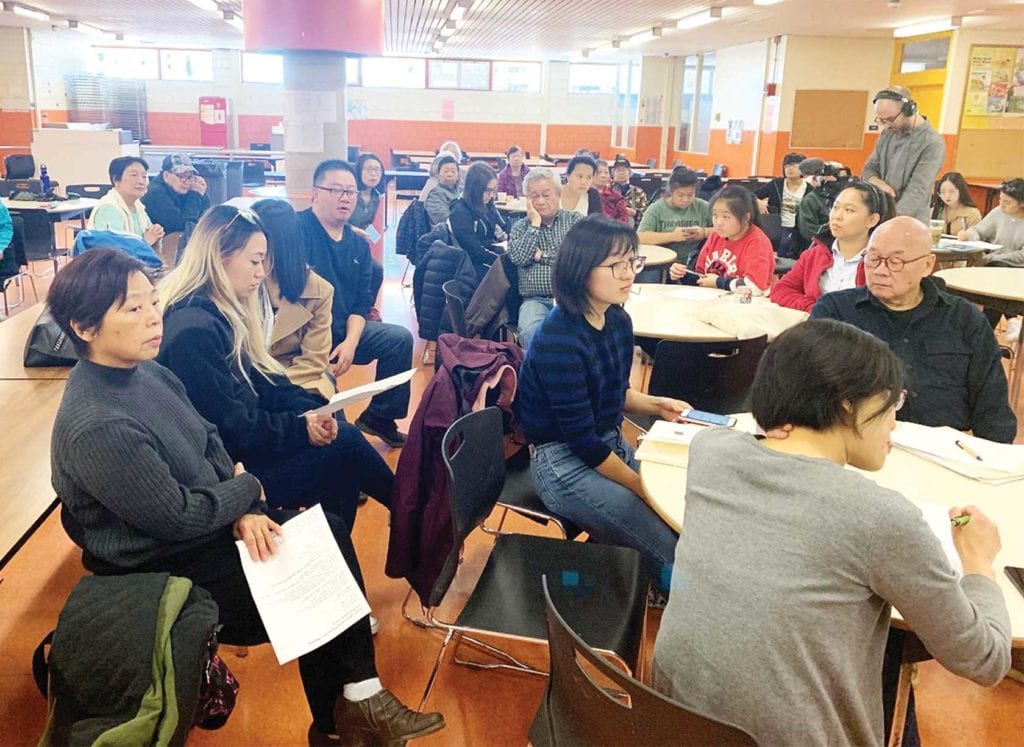Chinatown residents look to historical designation to preserve affordability
Row houses under threat as developers push for high-rises

Last Saturday, three dozen or so Chinatown residents filed into the Josiah A. Quincy School cafeteria to talk about historical and cultural preservation in the neighborhood. The mostly over-65 crowd had a lot to say about the changes they have witnessed in Chinatown over the last five years.
The Chinatown Community Land Trust called the meeting to begin a conversation that the group hopes to include in its 2020 master plan for Chinatown, said Director Lydia Lowe.
“With all of the changes in Chinatown and the wave of evictions and displacement that we experienced in the last five years, we’re thinking about how to preserve the community,” Lowe said. “We want to preserve the character of the community as a working-class family neighborhood.”
The Chinatown Community Land Trust is organizing its master plan with the Boston Planning and Development Agency’s PLAN: Downtown Boston, and it will be a map of what they want for Chinatown’s future, led by the community.

Chinatown residents are investigating how historic preservation could protect affordable housing in their neighborhood. PHOTO: SAPHIA SUAREZ
When meeting facilitator Daphne Xu asked community members what they wanted to see preserved, participants listed affordable elderly housing, Chinese supermarkets and Chinatown’s historical row houses. These homes are particularly important to community members because they are some of the first homes that Chinese immigrants moved to when they came to Boston, and many residents have nostalgic memories of growing up in these homes, Lowe said. She added that her team is already focusing its efforts on acquiring some of the row houses and making them permanently affordable housing through the community land trust model.
Regarding affordable elderly housing, an older woman from the audience said, “I feel that what defines Chinatown for me is affordable housing, elderly housing — we need more of it so that we don’t have to wait on a waitlist of a thousand folks.”
Other residents expressed concern for their neighborhood, and reiterated displacement and the construction of high-rise buildings as detrimental to the community.
One man said that there is no parking near his apartment in Mason Place because of the surrounding high rises and hotels. As a result, his children cannot come to visit him, he said, speaking in Chinese.
“Chinese people talk about filial piety, but my children can’t be pious because there are no parking lots, and when they do park, they get $85 parking tickets,” he said. “For elderly Chinese immigrants who are 80, 90 years old, if our children can’t come see us then it’s hard for us to solve problems, like health problems, or if anything comes up we don’t know who to ask.”
Lowe kindly remarked, “If I could suggest that we focus on what we want, not what we don’t want,” which shifted the conversation to one of action and possible next steps.
After a conversation on preservation, a local artist presented his plan for a public art project in which he will create a series of statues that focus on the role of Chinese immigrant labor, memorializing the immigrant history that older residents in the room emphasized earlier. The Land Trust also discussed the creation of an immigrant history trail.
Moving forward, the Chinatown Community Land Trust will use the video footage of community members’ question responses to create a section on historical and cultural preservation in the master plan. Judging from the passion apparent in the room throughout the conversation, the Chinatown community will have their eyes on the results of last week’s meeting.






